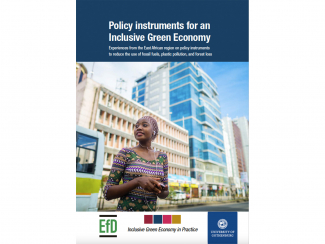FILTER
Displaying 71 - 80 of 600 publications
The objective of this document is to review, identify, and analyze opportunities for fiscal instruments in the waste management sector in Costa Rica, according to the priorities of the updated...
| Other Publications | Central America and Mexico
Global and local stressors have led to rapid declines in coral reef health. The high rates of coral degradation have motivated restoration initiatives worldwide. Evaluation of these initiatives has...
| Peer Reviewed | Central America and MexicoSustainable Energy Transitions, with emphasis on gendered and intersectional aspects, lies at the core of a low carbon society. The implications of energy interventions, policies, and transitions is…
| Report |Abstract High temperatures hinder learning. An effective solution is to control the environment. However, technologies such as air conditioning are seldom adopted in developing countries. Information…
| EfD Discussion Paper | Colombia
Abstract: With increasing scarcity and spatial dispersion of tree resources, Uganda's forest sector – similarly to several other countries in Sub-Saharan Africa – has experienced a shift from the...
| Peer Reviewed | UgandaAccording to the IPCC, changes to our lifestyles and behavior could result in a 40%–70% reduction in greenhouse gas emissions by 2050. However, promoting impactful behavioral shifts through norms…
| Peer Reviewed | Global HubWe explore how spatial interaction affects the strategic use of municipal income when deciding between 1) an optimal long-run expenditure strategy versus 2) using the current income to finance current…
| Peer Reviewed | Chile| Report | South Africa, Ethiopia, Uganda, Tanzania, Kenya, Global Hub
AbstractReaching decarbonization goals has become a top focus for several industrialized and emerging economies globally. The greatest effect of human behavior is global warming. Utilizing fiscal…
| Peer Reviewed |Highlights: ▪ Hire purchase schemes increase vendors' likelihood of buying an LPG cookstove. ▪ Hire purchase schemes with a learning opportunity have a greater effect on the vendor’s likelihood of…
| Policy Brief | Uganda

